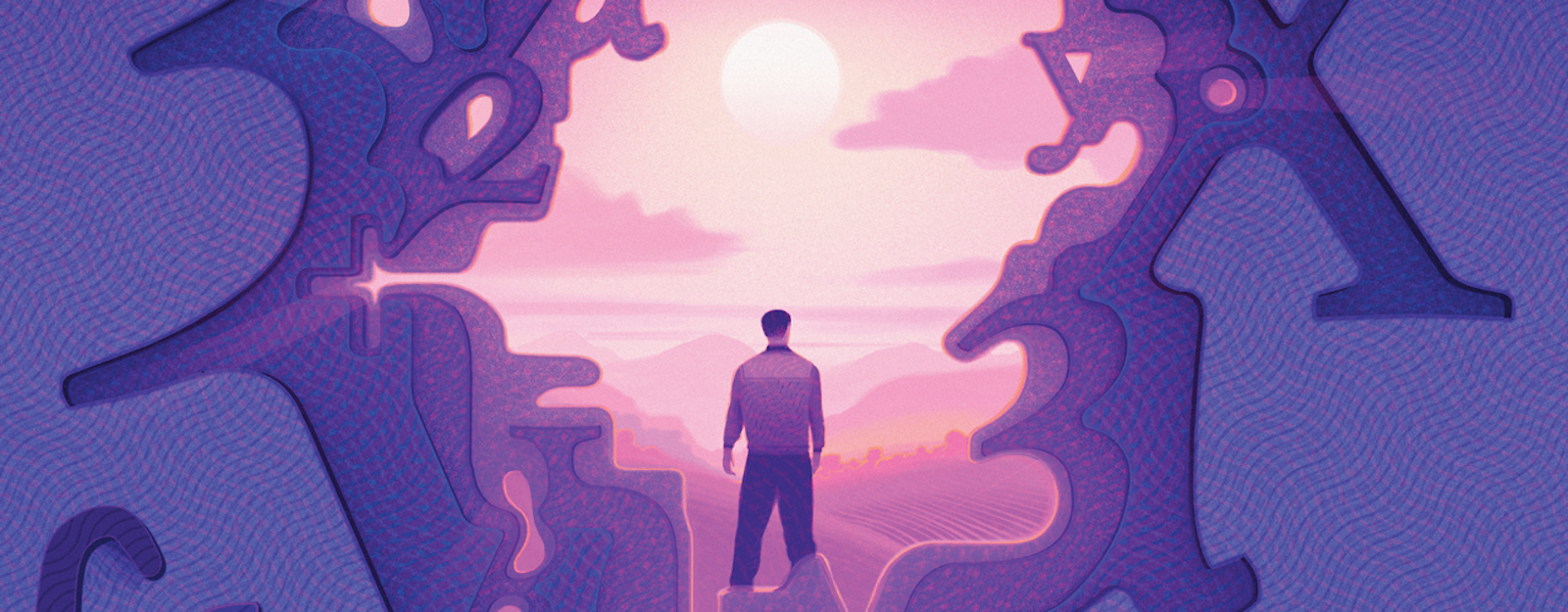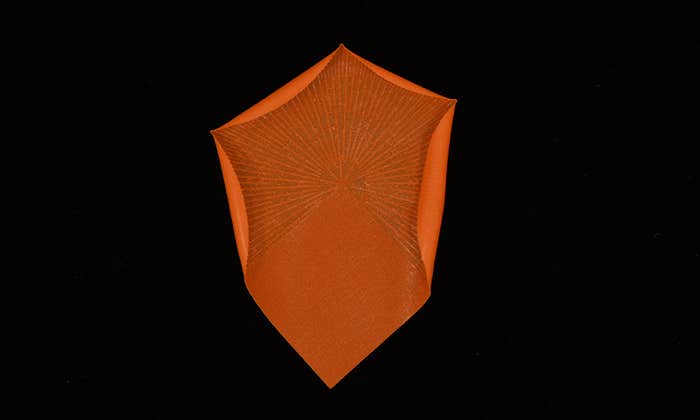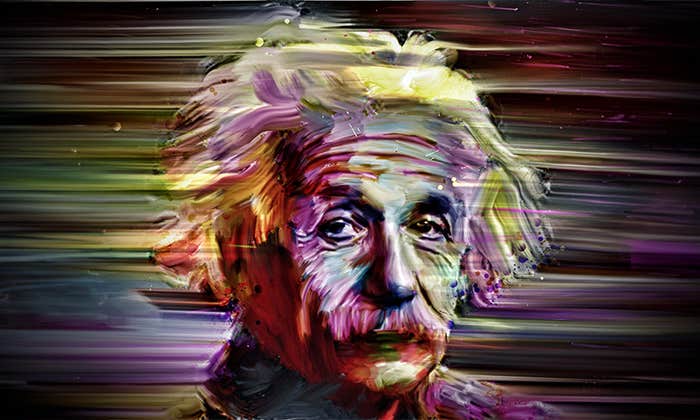I botched my first interview with Chris Fuchs. Fuchs is a physicist at the University of Massachusetts Boston and the leading proponent of QBism, one of the newest and most controversial of quantum theory’s many interpretations. It goes something like this: Quantum mechanics, the theory physicists use to predict the behavior of elementary particles like electrons and photons that make up matter and light, doesn’t actually pertain to particles, but rather to the beliefs about them of whoever is using the theory. And if several people are using it at the same time? Then QBism says that each of them is entitled not only to their own beliefs, but to their own facts.
It was August 2020 and Fuchs and I were talking over Zoom. He was slumped in a stuffed armchair, sporting wire-rimmed glasses and pandemic-long hair. He’d insisted I educate myself about QBism before talking to me, and had sent me 17 links to articles, interviews, and videos. Now he was regaling me with an anecdote-filled story of his career when I blurted out the question that had been bugging me all along, which was essentially, “How the hell could that be right?”
If our theories don’t mirror an underlying reality, in what sense can they supply explanations?
Fuchs, like me, is in his mid-50s, and has a boyishly rounded face. My blunder was immediately obvious in the way that face melted before my eyes, like wax under heat. In an instant he transformed from raconteur to lecturer, put up a picture of a complicated laboratory setup and began grilling me about it. “Do two guys who walk in and casually glance at this experiment agree what the experiment is doing?” he asked. The lecture concluded with a theorem sketched on a whiteboard. I was kicking myself the whole time, not just because I’d scotched my plan to get to know Fuchs better before wrangling over QBism, but because I couldn’t follow his argument anyway, despite my background in physics, including a Ph.D.
Actually, my education was part of the problem, as was the reason I went into physics in the first place. I was a tough case in elementary school, an intelligent and curious but also emotional and impulsive ADHD kid with a home life roiled by conflict and the confusion of stories that didn’t add up. Being class clown was my greatest ambition until a teacher discovered that I’d finished a math workbook in a weekend that was supposed to take a year. That led to me finding myself in the back of an algebra class in a panic, as a teacher tapped equations on the board, and I was baffled by the letters. What the heck is x? I suffered in silence until the epiphany finally came. X is a number, just one you don’t know yet. Euphoria! Plus, the sensation of having opened a door to a place containing many more doors leading to many more ideas beyond “x.” That palace of ideas, with its numbers and symbols and geometric shapes, soon became a playground as well as a refuge, a place where all my “why” questions had answers and where things made sense in a way that didn’t apply to the rest of my life. I was later drawn to physics for its promise that the palace was real, and that hidden somewhere inside it was one grand equation that, like the God I’d dismissed for being too magical, could ultimately explain everything.
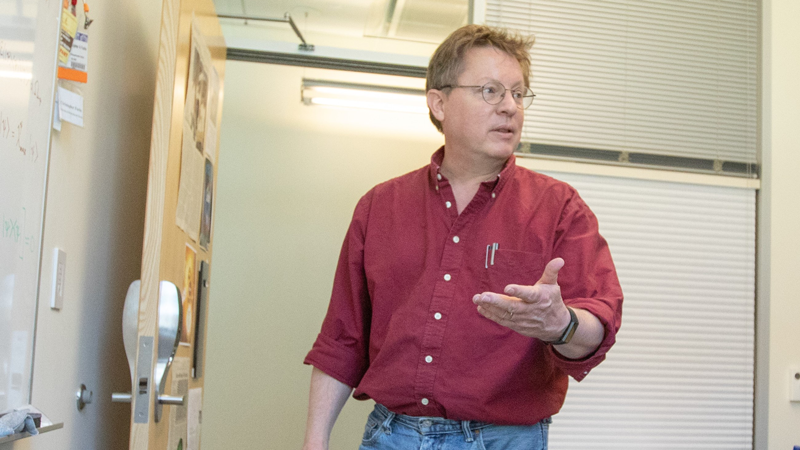
By the time I spoke with Fuchs I was less wide-eyed about physics (graduate school will do that to you), but the palace was still my happy place. I’d internalized a lesson that emotions are dangerous and developed an aversion to conflict and a craving for certainty that translated to my keeping a certain distance from people. Marriage, for example, had long been a bridge too far. And I doubted my ability to change, in part because a world that’s ultimately nothing but particles conforming to the laws of physics appeared to make free will a delusion.
At the same time, I could see there was a problem with the idea that physics can explain the world, because of the way quantum theory describes particles with probabilities rather than properties. We tend to think that the sizes, shapes, and locations of physical objects are explained by the locations of their constituent particles. Quantum theory, however, doesn’t attribute such properties to particles, describing them instead in terms of the probabilities that they will appear to have locations if and when they are observed. And yet what “observed” means and what happens during an observation to make properties materialize out of quantum theory’s murk of possibilities and into the solid shapes that objects have in our everyday experience are questions that the theory doesn’t address. Physicists call this gap in quantum theory’s account of explanation the “measurement problem.”
A host of interpretations of quantum theory offer an assortment of stories purporting to solve the measurement problem, but I wasn’t satisfied with any of them. QBism’s tale is the latest in a tradition that denies that quantum theory directly describes reality and yet, to hear Fuchs tell it, still offers the possibility of getting some grasp on what “reality” really is. “The world is not made of six flavors of quarks,” he’d written. “It is a world in which even dreams and ambitions have substance.”
That sort of woo raised a red flag in my materialistic mind, as did Fuchs’ habit of saying that QBism’s take on quantum mechanics “makes life worth living.” Still, it was clear that QBism was worth taking seriously, as it had been by a raft of recent physics papers including one in Nature Physics titled “Facts Are Relative.” So as unsettling as I found such ideas, I was determined to get on Fuchs’ good side and to learn how to think like a QBist myself.
A few weeks after my talk with Fuchs, high on a stony Adirondack peak, my heart pounding with nerves, I got down on one knee, looked up at my girlfriend Martina’s freckled face, and asked her to marry me. A few days later, I shared the story by email with Fuchs. Not something I’d usually do, but he’d sent me photos from his own wedding, 25 years before, on Ghost Ranch in New Mexico, former home of painter Georgia O’Keeffe. He’d fallen in love with Kiki in a week and, overcome with emotion, had proposed six months later with a cigar band for a ring, despite a promise to himself that he’d wait at least a year. I noted the contrast with my own proposal, made after the 30-odd years of bachelorhood it took me to get used to the idea, the two-plus years of dating that was my rule, and a grueling 4-mile hike up a mountain for good measure.
I blurted out the question that had been bugging me all along. “How the hell could that be right?”
I’d recovered from our first interview by talking to Fuchs a second time and keeping my focus on getting to know him personally. Once he was convinced that my interest in QBism was genuine, he began inundating me with emails, links, and reading lists, including four books by and about William James, whose philosophy was apparently important. Sprinkled into my QBism correspondence course came all manner of personal anecdotes and photos: of 20-something Fuchs in swim trunks on a beach, of his backyard smoker and the glistening meats he’d made with it, of him proudly holding up a giant weed he’d pulled from his yard. “I have no internal filter,” he told me. Still, not all of the deluge was amicable. Fuchs read an article I’d written for the New York Times Magazine and objected to my labeling the views of atomic physicists Niels Bohr and Werner Heisenberg “anti-realist.” He referred to that word as “that damned misnomer,” and said my comment calling those views a “dead end” had “nothing to do with the historical record.”
I figured my comments stung because if QBism is Fuchs’ baby, the closest thing to its grandfather is Bohr. Bohr won the Nobel Prize in physics in 1922 for devising a model of atoms in which electrons are confined to one of a discrete set of orbits around the atom’s nucleus, an idea that defied both the laws of physics at the time as well as common sense, since it required electrons to jump between orbits but to never be between orbits. Nonetheless, the model accounted for observed phenomena like the colors of light emitted and absorbed by hydrogen gas, and in 1925 Heisenberg conceived quantum theory by coming up with equations that predicted not only Bohr’s results, but other atomic phenomena as well. The strange thing was that Heisenberg’s handiwork was pure mathematical manipulation; his equations only referred to observable quantities like light frequencies and avoided any description of electron behavior that could explain why those frequencies were what they were.
Meanwhile, Erwin Schrödinger developed his own version of the theory that, by treating electrons as waves, he hoped would reveal the workings inside the black box that Heisenberg had made. But the mathematical object that Schrödinger called the wave function, now often called the quantum state, didn’t describe physical waves in the way he’d hoped. Instead, it became the standard device physicists use to summarize the theory’s probabilities. Albert Einstein, whose belief that physics can and should describe the world’s inner workings had always inspired me, figured the theory was simply incomplete. But Bohr and Heisenberg argued that the lesson of these developments was that physics describes something else. “The laws of nature which we formulate mathematically in quantum theory deal no longer with the particles themselves,” wrote Heisenberg, “but with our knowledge of the elementary particles.”
“Knowledge” meant the information encoded in the quantum state; for example, the probability that a given atom will appear at a particular location when it’s observed. Bohr proposed an explanation for why physics must give its account of reality from such a remove. “We must never forget,” he wrote, “that we ourselves are both actors and spectators in the drama of existence.”
Bohr’s point was that our observations change and to some degree create the world we observe, an idea supported by the way quantum theory implies that the observer of an object and the object itself necessarily become, to use Schrödinger’s word, entangled. What’s observed is not the object per se, but instead a kind of mash-up of the object, the observer, and all the choices made in the method of observation. Bohr called these mash-ups—things like the colors of light emitted and absorbed by hydrogen—“phenomena,” and concluded that quantum theory tells us that physics, rather than describing the world as it is, must describe such phenomena, or, as he also put it, the “human experience” of the world.
Many seemingly paradoxical behaviors of subatomic particles, such as those that appear in a classic case of quantum inexplicability called the double-slit experiment, can be demystified with this perspective. In the double-slit, particles such as electrons are fired at a screen with two holes in it, and the mystery is how they sometimes exhibit interference effects as if they were spread-out waves and yet in other circumstances act like point-like particles. To this day, there are physicists who argue that Einstein was right, that quantum theory is incomplete, and that so-called “hidden variables”—meaning particle properties not appearing in quantum mechanics—are necessary to explain this behavior.
But Bohr believed the apparent contradictions of quantum phenomena result from attempts to picture the world as it is apart from observation, when that’s something we just can’t do. A corollary was that concepts like “particle,” “wave,” and “which slit” an electron passed through are not realities but rather what Bohr called “abstractions”: ideas devised to describe phenomena in terms of observer and observed when that distinction doesn’t actually exist. In which case, an electron is neither particle nor wave; it just is what it is, or rather what it does when we interact with it. And despite how nonsensical it sounds: There is simply no fact of the matter of which slit an electron passed through unless that passing was observed.
Such was Bohr’s radical reimagining of physics. And yet, Fuchs argues, Bohr wasn’t radical enough.
QBukis,” in Fuchs-speak, are weekly meetings Fuchs has with his research group, nowadays on Zoom. I attended my first in October 2020. Fuchs was slouched in his chair, his pandemic hairdo now two months longer than when I’d last seen him. During the period of random banter that QBukis invariably start with, Fuchs brought up a favorite Wings song, “Let Me Roll It,” and played it for the group. As the crosstalk subsided, Fuchs asked Jacques Pienaar, a young postdoc working with him from Brazil, to take over and lead a discussion about a recent paper by a group of physicists who support a rival interpretation to QBism. The central question was how to deal with Wigner’s friend.
Everyone’s heard of Schrödinger’s cat, the thought experiment in which a cat is locked in a box with a quantum device having a 50-50 chance of releasing a poisonous gas. The point of confusion is that quantum theory’s quantum state characterizes the cat as a superposition of the two possible outcomes: dead or alive. While popular culture gets a lot of mileage out of imagining what it means for the cat to be in such a superposition, the theory doesn’t actually speak to that question, and Bohr would remind us that that’s because physics must restrict itself to describing human experience, in this case what the observer sees when he or she opens the box and looks. Schrödinger published this scenario in 1935. Oddly, it took a quarter of a century and another Nobel Laureate to ask what in retrospect seems like an obvious question: If physics is about human experience, why not put a person in the box?
That’s what Hungarian physicist Eugene Wigner did, calling the imaginary person his “friend.” Being a friend, Wigner switched out the poison for a device with a light, which we can imagine comes on either red or green. The result of Wigner’s analysis is that the friend in the box sees, for example, green and believes the quantum state should reflect that result, while Wigner, in the same position as the observer of Schrödinger’s cat, believes the state to be a 50-50 superposition of the two colors. Wigner’s state is analogous to that in the double-slit experiment and indicates, by Bohr-style reasoning, that there is no fact of the matter about the light’s color. The conclusion is that, while Wigner’s friend knows the green light is a fact, Wigner, with equal justification, knows it isn’t. This result highlights a troubling gap in Bohr’s and Heisenberg’s contention that quantum theory is about human knowledge and experience, namely the answers to the questions: Whose knowledge? And whose experience?
Everything seems super stable, and then you realize it’s not fucking stable.
The “Facts Are Relative” paper in Nature Physics, written by physicist Caslav Brukner, focuses on a variation of Wigner’s friend and argues that quantum theory’s capacity for contradictions runs deep enough to imply that facts are indeed relative to the observer, much as space and time were found to be by Einstein. This is a more bizarre conclusion than even Bohr and Heisenberg seem to have anticipated, but in a way it’s not new. The Many Worlds Interpretation of quantum theory, for example, claims that every possible outcome of every physical interaction happens, that the universe is constantly cleaving to accommodate all the resulting contradictory facts, and that in the case of Wigner’s friend both the device with the light and the friend divide into two, and then proceed to live separate lives with different facts (red vs. green) in distinct branches of a vast and ever-growing multiverse.
The QBists panned their rivals’ paper. Marcus Appleby, a longtime collaborator of Fuchs’, reclined on a sofa in Sydney, declared it “incoherent.” Blake Stacey, a physicist, like Fuchs, at University of Massachusetts Boston, was frustrated by the paper’s assumption that two physicists can communicate perfectly about experimental outcomes.
Listening to the QBists eviscerate what would otherwise seem to me a passable paper made me feel as though I’d happened upon a more advanced civilization, of aliens maybe, to whom premises that most physicists take for granted are deemed antiquated and naïve. It was Fuchs who delivered the QBist coup de grace. The authors, he said, “don’t even worry about what the hell probability means.”
As I logged out of the meeting, that comment struck me as capturing the defining observation of QBism: Quantum mechanics describes everything with probabilities so what “probability” means is central to what the theory is about. The problem is that philosophers and mathematicians have been debating that since long before quantum theory and, as Bertrand Russell said, “nobody has the slightest idea what it means.”
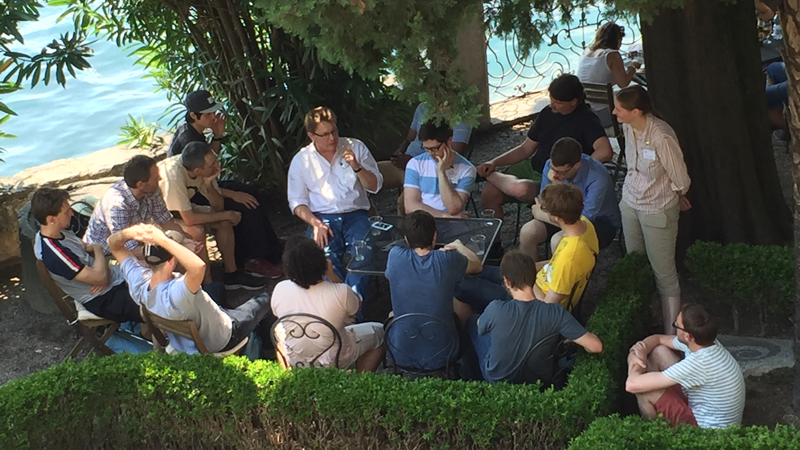
Probability, like love, beauty, and good taste, resists objective definition. That’s easy to see in situations like a coin toss, where Newton’s laws assure us that no real randomness is involved and that a person armed with a video camera and an appropriately programmed computer could potentially predict the outcome far more competently than a more casual observer who assigns a 50 percent probability to heads. But even in the quantum case, where the indeterminacy is intrinsic, there is no escaping the fact that the probabilities a person assigns are to some degree subjective, depending on their experience, knowledge, preferences, and even their personality—there’s always that guy who thinks he knows more than he does.
QBism’s core tenet is that probabilities are completely subjective, the personal beliefs of whoever is assigning them, constrained only by the rules of probability theory such as one which says that each must be valued between zero and one. This interpretation of probabilities is called “personalist Bayesian.” The “Q” in QBism stands for quantum and the “B” for Bayesian (or at least it did until Fuchs ditched that connection and made QBism its own brand, like KFC). It, like Fuchs’ marriage, got its start in the mid-1990s when he was a graduate student at the University of New Mexico in Albuquerque studying under physicist Carlton Caves and determined to get to the bottom of quantum theory. It was Caves and particularly his postdoc Ruediger Schack who won Fuchs over to the personalist Bayesian perspective, and QBism grew out of a collaboration between the three.
QBism’s account of quantum theory’s meaning follows from its core tenet. If the quantum state of an atom, for example, is considered to describe the atom, then quantum theory, which is basically a bunch of rules for how states evolve, amounts to a system for predicting what the atom might do. But with probabilities construed as beliefs, the quantum state becomes beliefs too, and the entire theory transmogrifies into a whole other animal. The state of the atom then describes the theory’s user, specifically their beliefs about what they may experience by probing the atom. And the theory’s rules then govern those beliefs, informing the user about how to optimize them. Fuchs calls quantum theory a “law of thought,” and “a system for making better decisions in light of the world you’re in.”
This viewpoint resolves the contradictions in Wigner’s friend. Wigner’s and his friend’s states differ because they represent different users’ beliefs about their potentially different future experiences. QED.
It’s almost too easy, the way QBism quashes quantum conundrums. And it took a while for its implications to sink in.
One day, in the depths of a pandemic winter spent holed up in a house in the woods with my new fiancé, I looked out the window and saw a titmouse hopping around in the snow. I realized, with a shock, that the QBists would say that what I was calling a titmouse was not actually a thing in the world, and that this was the key to their solution to the measurement problem. An “observation,” says QBism, is simply a human experience, like the one I was having looking out the window. As for how such observations make facts like the titmouse’s location and other properties emerge from the quantum murk, QBism says that those properties are not objective facts but rather beliefs I’ve conceived to account for my experience—similar to Bohr’s “abstractions” but now personal to me. I suddenly appreciated why in QBism there is no divide between the intangible quantum world and the concrete everyday one: Everything in my everyday world, from hopping titmice to my iPhone, has the same diaphanous character as a quantum state, all of it being part of one big web of beliefs weaved by my mind to explain my experiences.
Fuchs’ philosophical hero, William James, had said as much several decades before quantum mechanics as part of a theory of knowledge called pragmatism. He and other pragmatists, in the wake of Darwin, the Civil War, and a proliferation of scientific theories in the 19th century whose conceptions of reality did not necessarily jibe, concluded that our ideas, theories, and beliefs couldn’t possibly mirror an underlying reality, while at the same time not questioning such a reality’s existence. Instead, they argued that our ideas are derived from our experiences, that they are tools that we construct to navigate the world, and that their truth can only be judged by how well they do so. As I read the references Fuchs had provided, I found myself sympathetic to these arguments, even if the experience was sometimes painful. To James, I was a “tender-minded rationalist,” whose dreams of finding the foundation of reality in the palace of ideas was “perverse abstraction worship.”
Ouch.
Still, if quantum theory is, as QBism says, all about beliefs, that leaves an awfully big hole in physics where reality used to be. Einstein felt the same about Bohr’s take on quantum theory, which is why he once asked a colleague if he really believed that the moon isn’t there if no one’s observing it. “Of course @#$%&! would remain if there was no one about, but the word ‘moon’ and the sentence it’s embedded in would cease to have meaning,” Fuchs wrote in response to the question at a physics conference in 2021. “Reality need not be sentence shaped, and I tend to think quantum theory indicates it is not.”
Which was Fuchs’ way of saying about the moon what I’d realized about the titmouse. He’d call either a “bundle of expectations,” just as he had a wine glass in one QBuki, saying, “If it’s a wine glass then it should break if I drop it. If it’s a wine glass then it should hold liquid,” and so on. But as for whatever object or reality there may be “behind” our experience of the moon or the titmouse, well, we might as well call it @#$%&! because we have no words for things behind, beyond or in any other way outside of our experience. QBism’s core tenet implies that quantum theory describes the reality we construct in our minds— the one of titmice and the moon—rather than some objective state of affairs in the world. James and Bohr argued that this reality derives from our experiences. And Wigner’s friend shows, as one QBist paper put it, that this “reality differs from one agent to another.” QBists sometimes summarize all this by saying that a “God’s-eye view” of reality doesn’t exist.
As much as I appreciated the efficiency with which QBism dispensed with the measurement problem, I still struggled with it. There sure seem to be objective facts in the physical world. There is the fact that if I leave my laptop on my desk at night, it will still be there in the morning. There is the fact that if I call Martina down to my office, she’ll confirm its location. Not to mention all the facts about matter, light, and the world in general that physicists look to quantum theory to explain, from the periodic table to the blue color of a clear sky. If QBism was right, and what I and everyone else calls the physical world amounts only to subjective beliefs, how do we explain such facts?
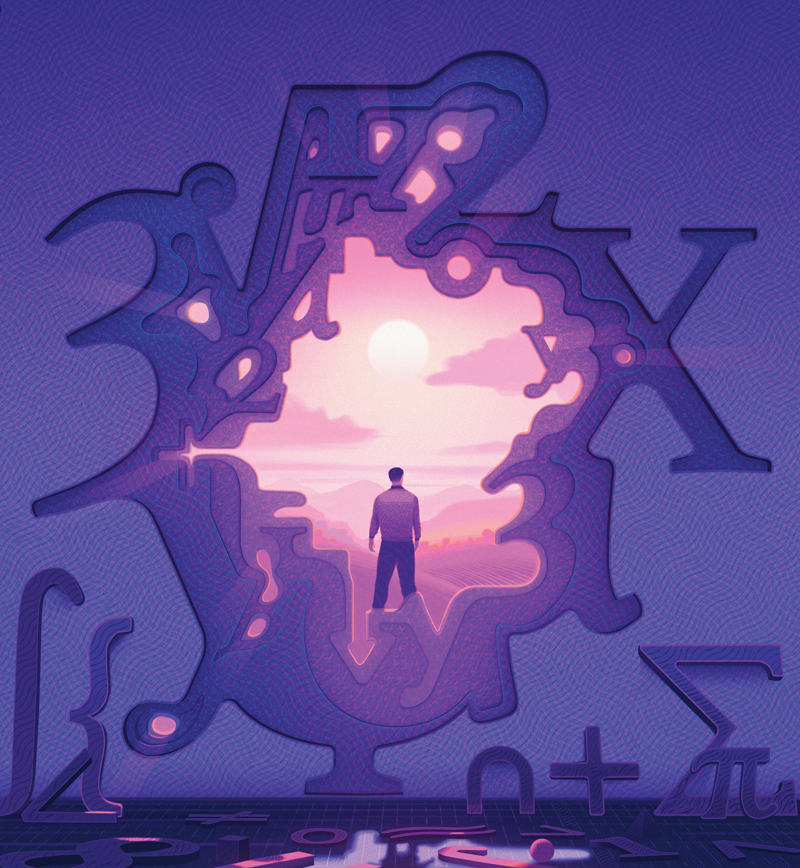
It was a Friday afternoon in March, and this time there were 12 people on the QBuki Zoom call besides me: Fuchs, in a gray hoodie and his usual chair, his QBist collaborators, and a few “QBissels”— people like me who were intrigued by QBism but not yet convinced. Fuchs’ inbox had gotten so clogged with emails from me trying to understand QBism’s explanation of physical facts that he finally suggested that I run a QBuki myself and put my questions to the group.
I’d been struggling with the dichotomy of how small things, like electrons in the double-slit, behave in ways that defy description in terms of them having properties—meaning facts about them that are independent of how they’re observed—while big things like wine glasses are describable in terms of facts, like size and shape. The common-sense idea that the facts about a thing reduce to those of its parts must somehow break down. But still …
“Do we really have to reject the idea that the bundle of expectations that is the wine glass is derivable or at least closely related to the bundle of expectations of the atoms that make up the glass?” I asked.
“Very often, Bob,” Fuchs responded, sounding like a teacher whose patience is being tried by a slow student, “it feels like you’re still always putting the little guys down as the more basic things and the bigger guys down as the more derived things.”
“The reason I think of atoms as more fundamental than the glass,” I explained, “is that they’re presumably simpler, right?”
This prompted a barrage of rebuttals from the group. The simple-seeming single colors that comprise white light, someone pointed out, require the philosophically complex concept of infinity for their definition. Even elementary particles are, per quantum theory, “infinitely complicated,” another said.
Before I could assess the damage done to my point, Fuchs changed the subject.
“Bob often brings up the stability of the world,” he said, referring to the kinds of dependable regularities I wanted explained, from the way my laptop stays put at night to the repeatability of scientific experiments. Fuchs mentioned the Hollywood movies he’d seen in which a happy family in a car gets hit by a truck. He brought up 18th-century philosopher David Hume’s argument that no matter how many times the sun has risen in the past we can’t be sure it will in the future.
“The sun always rises, until it doesn’t,” he said. “You can count on family stability until you can’t.”
Hollywood? Car crashes? I didn’t see his point. But again, before I could respond, physicist, QBissel, and Pienaar’s wife Gabriela Barreto Lemos chimed in to say that it was extremely hot where they were in Rio, that their air conditioning worked until it didn’t, and that she’s been noticing recently how everything is changing all of the time.
“It’s amazing,” she said, “because when you start doing that, your whole world is like, Boosh!,” she mimed an explosion with her hands. “Everything seems super stable, and then you realize it’s not fucking stable; I’m not stable. You’re not stable. My computer’s definitely not stable. The air conditioning is not stable. Nothing is.”
“I love it!” shouted Fuchs.
So did everyone else. A round robin of testimonials to the world’s inherent instability ensued from QBists and QBissels alike. Buddhism and Alfred North Whitehead were cited in support. I was disoriented, but also sympathetic. Things with Martina had been getting more strained. Living together through a pandemic had taken its toll. I’d even started to question whether marriage made sense. Gabi is right. Nothing is stable.
Listening to the QBists eviscerate a paper was like I happened upon a more advanced civilization of aliens.
It was five o’clock, about the time Fuchs usually started making noises about his imminent cocktail. I could have used one myself. But the QBists were on a roll and I sensed that Fuchs wanted to finish me off.
“What was your next question, Bob” he said.
I took a breath and steered the discussion to hydrogen, the simplest of the elements, and the one whose frequencies Bohr and Heisenberg contended with back in the day. I said I wanted to understand why, if those frequencies are not objective facts about the world, do we all agree about what they are.
“There’s something to be explained there,” I said, “because what does it mean to be subjective? It means that different people can have different opinions, right?”
“I’m just slowly losing it,” Fuchs responded. “Maybe this is why I’ve never answered you in email. We agree when we agree and we don’t when we don’t. I can’t imagine that there is some precondition in the universe that says we must agree about anything, anything whatsoever.”
“Then the answer is just outside of QBism,” I said. “It’s out of scope. That’s fine.”
A few objections were lobbed at me in response, but Fuchs and I stayed out of it. Fuchs then brought the meeting to a close.
“Bob, you have been thought-provoking,” he said.
What I felt like I’d been was pummeled.
It took several more QBukis, numerous one-on-ones with the QBists, and quite a bit of time for me to finally wriggle free from the ruts of my old ways of thinking and to realize that, to a QBist, a wine glass is not made of atoms. Once things are reconceived as bundles of expectations, big ones aren’t made of smaller ones since beliefs don’t work that way. Atoms become instead an aspect of wine glasses rather than their constituents, meaning a concept that encapsulates some of our expectations about them, such as how they will look under an electron microscope. That realization led to another that was even more startling to me than my encounter with the titmouse: that to a QBist, physical things are more than just atoms.
I also appreciated that the point of Fuchs’ car crashes was that all the so-called facts about the world that we glean from observing it are, strictly speaking, beliefs, since future experiences could reveal them to be false. No sensible scientist would disagree, and an irony that I was just starting to perceive about QBism was that its most radical claim is not so much that our facts and ideas are subjective in this way, but that it has identified in quantum theory a single one that is not.
But there was still one big nut I hadn’t cracked: the one that had set Fuchs off at the end of the meeting, the question of why people agree about physical facts if those facts don’t exist objectively. Sure, part of the answer is that as members of the same species, we respond to similar stimuli in similar ways; but that still begs the question of what the sources of those stimuli are, because despite Hollywood’s car crashes and Barreto Lemos’s faulty air conditioning, the world does have stable features, including the existence of my laptop, the characteristic colors of hydrogen gas, and all the other physical phenomena that people with working senses do agree about and that, at least to my way of thinking, quantum theory was originally developed to explain. I mean that’s what science is about, right? Explaining things? Finding truth?
Over the summer, I spoke to several specialists who confirmed that I was not alone in my frustration.
Jean Bricmont is a retired professor of physics at the Catholic University of Louvain in Belgium. His books include Making Sense of Quantum Mechanics and Quantum Sense and Nonsense. Bricmont wants to ask the QBists, he told me, “What is your belief about? They’re subjective beliefs, OK, but about what?” He didn’t buy my suggestion that QBism was an improvement over Bohr because it solves Wigner’s friend. “It’s an improvement only insofar as it reveals the absurdity [of Bohr’s interpretation],” he said. “It’s pure idealism.”
Oxford philosopher Christopher Timpson has thought deeply and written much about QBism. Although he remains relatively sympathetic to it, he still considers its lack of explanation of physical facts a potential “killer blow.” “If you want, as very plausibly one should want, a thicker notion of explanation which stands independent from merely what we expect,” he said, “then the QBists can’t deliver it unless they make some clever new developments.”
I was particularly eager to hear from Carlton Caves, Fuchs’ old research advisor and collaborator, whose input had been crucial to QBism’s early development. I knew from Fuchs that he’d ultimately lost his enthusiasm for it. Why? I wondered. “I look out my window and there’s an oak tree there,” Caves told me. “I expect other people to look out my window and tell me there’s an oak tree there, and there’s nothing in QBism that would suggest there’s any reason to think that that would be true.”
Caves had worked with Fuchs and Schack for more than a decade and considers them both “incredibly deep thinkers.” He called their collaboration the “first golden age” of his career. But in the end, the implications of probabilities being beliefs led to a place that was, he said, “not where I want to be.”
Ruediger Schack, the third of QBism’s co-founders, was still a believer. He’s a professor of mathematics at Royal Holloway, University of London. He has a deep voice and an economy of speech that leads Caves to call him “Mr. Terseness” to Fuchs’ “Mr. Prolixity.” When I told Schack that Timpson called QBism’s lack of explanation of physical facts a “killer blow,” his response was, in effect, an indifferent yawn. “QBism can predict that the color of ruby is red,” Schack said. And that, he said, “is all the explanation I need.”
I understood why Caves called him Mr. Terseness. But it was Schack’s equanimity above all that helped me put the final piece of the QBism puzzle in place: It convinced me that Schack’s own craving for explanation had been satisfied. To be able to predict, he was saying, is to have an explanation, not one that’s necessarily simple enough to be summed up in a few sentences, but one that resides nonetheless in all the knowledge and know-how that went into the prediction. William James and his fellow pragmatists would, I believe, have agreed. After all, if our ideas and theories don’t mirror an underlying reality, in what sense can they supply explanations? “Truth in our ideas,” James wrote, “means their power to work.”
Rationalists like me crave mechanistic explanations: A ruby is red because the electrons in its atoms move in a specific way, and anyone looking out Caves’ window will see an oak tree for similar reasons. But when atoms are considered concepts as opposed to constituents of rubies, mechanistic explanations no longer apply. It’s a “stock rationalist trick,” James wrote, to treat concepts we invent to explain phenomena we observe. We could claim, James said, that a man digests and sleeps well because he is healthy. But “healthy” is just a word coined to describe someone who digests and sleeps well, so that claim is no explanation at all. QBists believe that quantum theory validates James’ conceptions of truth and explanation because attempts at mechanistic explanations for quantum phenomena like the double-slit lead to paradoxes—such as electrons being both particles and waves.
I soon found myself applying such pragmatic thinking to day-to-day life, including my disagreements with Martina. What was the point, I thought, of all the “why” questions I was always asking her and myself. Why is it so hard to put things back the way they were? Why am I so bothered that she doesn’t? What I really needed, and what were so often right in front of me, were answers to “How?”
And yet I couldn’t feel satisfied with the notion that knowing how is as good as knowing why in physics, for the same reason that Bricmont dismisses QBism out of hand and that I once called Bohr’s ideas a dead end: It seems to imply that physics ends at human experience and can’t speak to the nature of reality beyond that.
Fuchs disagrees.
It was a steamy morning in July of 2021, in that hopeful period post-vaccines but before Delta. Fuchs was sitting in a white Adirondack chair in his backyard, crossed bare legs and Birkenstocks supporting the laptop in which he was engrossed. I’d driven to his home in Quincy, Massachusetts, from mine in upstate New York and we, abiding by long-ingrained middle-aged-guy manners, shook hands. I think he may have been a little nervous. I know I was. I’d never before had such intense interactions with someone I hadn’t even met.
He showed me around his expansive suburban backyard, a charmingly chaotic sprawl of patios, herbs and vegetables growing in pots, fabricated flowers and giant insects made of metal and wood, and the tools and hardware for innumerable partially finished projects, all surrounding a large slate blue house. A big tan and white dog named John Archibald barked nonstop at me until he settled down. Kiki made muffins. And for the next two days Fuchs and I hung out in his yard and house and engaged in the kind of long, free-flowing conversation that you can’t have on Zoom.
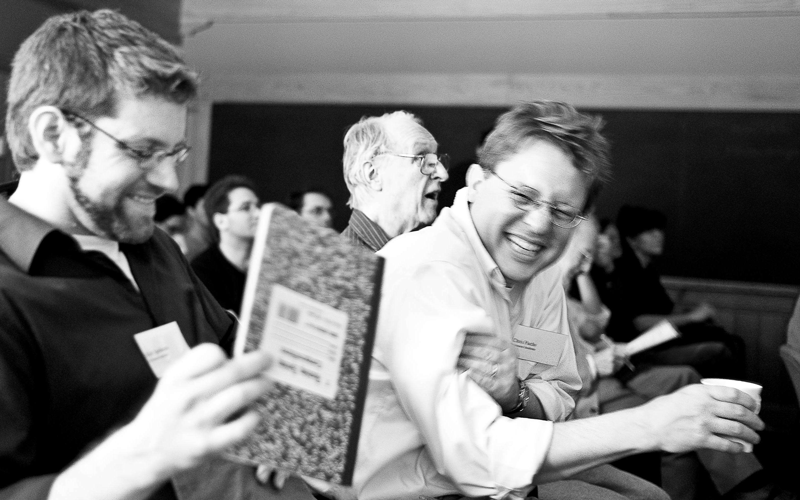
After our initial tour, Fuchs recounted how he came to physics. He’d already told me about growing up “pretty poor” in the small Texas town, Cuero, and about a childhood that involved at least as much conflict and confusion as mine. Now he explained how he’d found refuge in science fiction, including Isaac Asimov’s books and Star Trek on TV. He’d dreamed of living the life of Captain Kirk, flying to the stars and exploring strange new worlds. That led him to the physics section of the library, where he went to learn how to make that happen.
“It was like porn for me,” he said about the books he took home. The equations went over his head, but he understood enough to discover the disappointing truth that Einstein’s theory of relativity, and its prohibition on faster-than-light travel, made his Star Trek dream impossible. “The laws of physics aren’t going to allow it,” he recalled telling his best friend. “So they’ve got to be wrong.”
Fuchs explained he was inspired by the scientific writings of physicist John Archibald Wheeler, a professor at the University of Texas at Austin. Once, while attending the American Legion’s Boys State program in Austin, Fuchs snuck off to meet Wheeler. The professor was out of town, but his secretary let him take a sampling of his papers, including one on an idea called “law without law,” which was that the laws of physics are not hard and fast but rather only approximations that arise from quantum randomness, similar to how order emerges from chaos in Darwin’s theory. It was an idea that offered Fuchs hope that his dream was not dead. As the other John Archibald lolled in the grass nearby, Fuchs stopped at this point in his story. A surge of emotion made it hard for him to speak. “I was like Whoa!” he said. “I’ve got to understand quantum mechanics!”
Fuchs did his bachelor’s in physics at UT, with Wheeler as his research advisor. He also earned a bachelor’s in mathematics. “It from bit” was another Wheelerism. It expressed his belief that an electron, as Fuchs put it, “is nothing more than our information about it.” Inspired by that idea, Fuchs found his way to Caves and Schack on a mission to understand quantum mechanics in information terms.
While I’d gone into physics seeking something solid to believe in, Fuchs went with precisely the opposite orientation: with hopes of showing that the laws of physics aren’t solid. Years later, it seemed that he’d succeeded too well. QBism’s core tenet that probabilities are personal beliefs had led to the conclusion that every part of quantum theory, from quantum states to the lab equipment used to measure them, had the metaphysical status of subjective beliefs, with no apparent foundation in objective reality.
“So where do you go with that?” Fuchs said. “You would think, well, you can’t go anywhere now. Everything is subjective.”
The sound of blue jays jeering came from some nearby trees.
“And then you think on it for a few years,” Fuchs continued, “and then you go, Oh! Oh! Quantum probabilities aren’t freewheeling. They’re all tied together!”
This was the insight that led to QBism’s most profound claim: that there is one thing in quantum mechanics that is not subjective, that everyone should agree to. It’s not really a thing but a rule, a new mathematical rule that constrains a person’s choices beyond the restrictions of standard probability theory. To a QBist, this new rule constitutes the essential content of quantum mechanics, and signals what the theory can tell us about the nature of reality, even beyond human experience. The rule’s most crucial feature is that it is “normative,” meaning that it tells the theory’s user how to think rather than how the world behaves. Fuchs’ compares it to the Ten Commandments. One can disregard it, but “something bad is likely to happen as a result.” “Bad” meaning that your computer, nuclear reactor, MRI machine, or any other application of the theory simply won’t work.
We were now in Fuchs’ living room, him on his sofa, bare feet on the coffee table, and me in a chair nearby. I asked him what the normative character of quantum theory’s new rule says about nature’s doings. That their probabilities “can’t be quantified,” he said, that “there’s no number that will shoehorn a potential event.”
I was reminded of something I’d read before. “Nature and its parts do what they want,” Fuchs had written, “and we as free-willed agents do what we can get away with.”
Fuchs sounded a lot like James, who speculated that “experience as a whole is self-containing and leans on nothing,” meaning that no deeper layer of reality explains our experiences, because the experiences themselves comprise the ultimate reality. James called his vision a “pluriverse,” a place in which no thing was more fundamental than any other, where mental phenomena like dreams and ambitions are as real and substantive as anything else, and where, he wrote, “being comes in local spots and patches which add themselves or stay away at random, independently of the rest.” James’ pluriverse was the furthest thing imaginable from what he called the “block universe,” one that amounted to a giant machine, built from fundamental ingredients and governed by immutable laws. The pluriverse was a wilder and more heterogeneous place, one that was forever unfinished as its motley cast of constituents pushed, pulled, and clashed with each other in a never-ending process of construction, each driven by its own unknowable inner nature, each free from the reins of any top-down laws at all.
This is Fuchs’ understanding of the world, too. “I think the chair that I have my feet on has as much of an inner life as I do,” he’d said in one QBuki.
Our conversation circled back to Wigner’s friend. Fuchs compared the scenario to one of those Escher drawings, of say a staircase, which displays in two dimensions a situation that can’t exist in three. In the analogy, Wigner’s and his friend’s contradicting facts are like two sections of the staircase: They can peaceably co-exist so long as we don’t try to interpret them as aspects of a single block universe.
I was finally appreciating how quantum theory could substantiate the pluriverse idea. How James’ “experiences” and Bohr’s “phenomena” could be one and the same. How quantum theory’s mysterious acts of “observation” could correspond to James’ “facts in the making.” And how it might be that there are no variables hidden in Heisenberg’s black box, because reality is simply the phenomena, the experiences, out of which that box was built—and more generally that there may not be any deeper reality hidden in the palace of ideas because it too is derived from experiences and not the other way around.
And I could see why Fuchs kept saying that quantum theory makes life worth living. “The world stands really malleable,” wrote James, “waiting to receive its final touches at our hands. Like the kingdom of heaven, it suffers human violence willingly. Man engenders truths upon it.”
It’s that malleability that gives Fuchs hope, because to him it means that the laws of physics only summarize the experiences humans have had so far, do not limit those we may have in the future, and are even, to some extent, shaped by human activity. “One day we will get to the stars, in the sense of Star Trek,” he said from his sofa. “How’s that going to happen? I don’t know … But if you buy the ideas of James … then you’ve bought into a hope that it can happen.”
Hope, yes, but as to going further, Fuchs unfortunately is “stuck.” He told me this a couple of weeks earlier in a one-on-one Zoom call, while wearing a “Life is Crap” T-shirt illustrated with a cartoon bird pooping on a sad face. I’d run my fifth and final QBuki a few days before and he’d written me an email saying he felt sorry for me, because of how exhausted I looked by the end. He suggested we talk to try and iron things out.
His tone was completely different than I’d ever heard before. He spoke to me as if were colleagues rather than like an oracle, speaking down from above. He confessed that the QBism project was stuck and explained why he’d snapped at me in the QBuki a few days before. “You got my ire because you, poor fellow, made the poor choice of word ‘repeatability,’ ” he said. Repeatability just meant the ability of scientists to repeat experiments. What was wrong with using that word? “Well,” he said, “I’m trying to construct a philosophy where nothing is repeatable, where the world is fresh in every moment.”
Trying to construct. I suddenly realized how much of QBism is a product of Fuchs’ desire and how much its future depends on faith. Fuchs went on to tell me a story he’d written a long time ago which, although he’s an atheist, recounted a conversation between Adam and God. Adam wishes for a world like Fuchs wants to believe in. And God grants his wish by making the world conform to quantum theory, such that it grows unbound by laws as James envisioned, and yet where science can progress by finding normative rules to navigate it, including potentially to the stars. “Faith uses a logic altogether different from reason’s logic,” James wrote. “Reason claims certainty and finality for her conclusions. Faith is satisfied if hers seem probable and practically wise.”
Fuchs said he abides by the chain of thinking of James’ faith ladder:
“It would be well if it were true …”
“It might be true …”
“It ought to be true …”
“It shall be true,” goes the last step: Act as if it is and it will be.
Fuchs and his QBists are now looking for ways to flesh out fuzzy philosophical ideas like “experience,” to translate them into mathematical language, and to show in detail how quantum mechanics follows from them, which is to say to explain why that particular theory is the optimal “law of thought” to survive and thrive in the pluriverse. How to go about that is not at all clear.
“I think there is a better story to be told,” Fuchs said across the coffee table, “but we don’t know how to do it yet.”
We talked for a long time about the challenges of abandoning a God’s-eye view when thinking through situations like Wigner’s friend. What, after all, is “the” situation if all that is real are Wigner’s and his friend’s individual experiences? I said I couldn’t see how to think that way. “It’s a struggle for me too,” Fuchs said. “You’re asking tough questions. You really are a member of the group.”
Maybe he was being polite. But I believed him— even if I wasn’t quite ready to take the leap of faith that a true QBist needs to make.
A week after I left Fuchs, on a vast green lawn overlooking the Hudson River and the Catskill Mountains beyond, Martina and I stood under an arch of white flowers and exchanged vows in front of our families and friends. Although I had a lot of things on my mind in the preceding days, one was how to think more like a QBist.
I chuckled at an irony. I’d started off hoping to understand QBism’s way of reconciling the familiar everyday world with the foreign quantum one and ended up open to the idea that we’re all living in the quantum world. How much my new outlook came from Fuchs versus my love for Martina was impossible to know—my thoughts and feelings were too entangled to separate. But it seemed right, as QBism claims, that the everyday and quantum worlds are one and the same. That uncertainty is unavoidable and unquantifiable. That people can have different realities but must live in the same universe. That we are more than just atoms. That our choices are our own. And that our futures are not limited by our pasts.
It ought to be true … ![]()
Bob Henderson is a writer based in upstate New York who earned a Ph.D. in theoretical physics, and has previously made his living as a photojournalist, electrical engineer, financial quantitative analyst, and derivatives trader.















